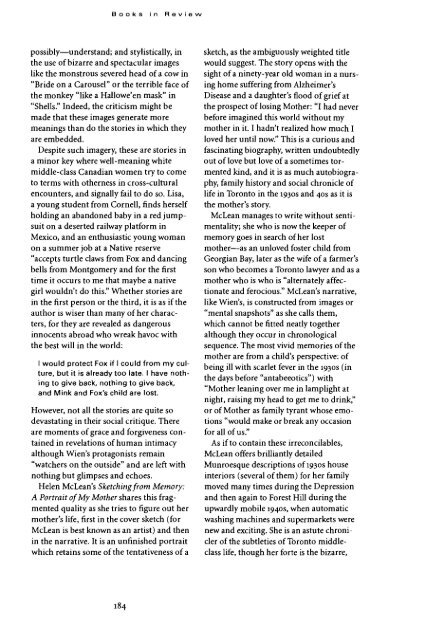A Quarterly of Criticism and Review i^^^^^^^^fcEjfc $15
A Quarterly of Criticism and Review i^^^^^^^^fcEjfc $15
A Quarterly of Criticism and Review i^^^^^^^^fcEjfc $15
You also want an ePaper? Increase the reach of your titles
YUMPU automatically turns print PDFs into web optimized ePapers that Google loves.
B o o k s in R e v i e wpossibly—underst<strong>and</strong>; <strong>and</strong> stylistically, inthe use <strong>of</strong> bizarre <strong>and</strong> spectacular imageslike the monstrous severed head <strong>of</strong> a cow in"Bride on a Carousel" or the terrible face <strong>of</strong>the monkey "like a Hallowe'en mask" in"Shells." Indeed, the criticism might bemade that these images generate moremeanings than do the stories in which theyare embedded.Despite such imagery, these are stories ina minor key where well-meaning whitemiddle-class Canadian women try to cometo terms with otherness in cross-culturalencounters, <strong>and</strong> signally fail to do so. Lisa,a young student from Cornell, finds herselfholding an ab<strong>and</strong>oned baby in a red jumpsuiton a deserted railway platform inMexico, <strong>and</strong> an enthusiastic young womanon a summer job at a Native reserve"accepts turtle claws from Fox <strong>and</strong> dancingbells from Montgomery <strong>and</strong> for the firsttime it occurs to me that maybe a nativegirl wouldn't do this." Whether stories arein the first person or the third, it is as if theauthor is wiser than many <strong>of</strong> her characters,for they are revealed as dangerousinnocents abroad who wreak havoc withthe best will in the world:I would protect Fox if I could from my culture,but it is already too late. I have nothingto give back, nothing to give back,<strong>and</strong> Mink <strong>and</strong> Fox's child are lost.However, not all the stories are quite sodevastating in their social critique. Thereare moments <strong>of</strong> grace <strong>and</strong> forgiveness containedin revelations <strong>of</strong> human intimacyalthough Wien's protagonists remain"watchers on the outside" <strong>and</strong> are left withnothing but glimpses <strong>and</strong> echoes.Helen McLean's Sketching from Memory:A Portrait <strong>of</strong> My Mother shares this fragmentedquality as she tries to figure out hermother's life, first in the cover sketch (forMcLean is best known as an artist) <strong>and</strong> thenin the narrative. It is an unfinished portraitwhich retains some <strong>of</strong> the tentativeness <strong>of</strong> asketch, as the ambiguously weighted titlewould suggest. The story opens with thesight <strong>of</strong> a ninety-year old woman in a nursinghome suffering from Alzheimer'sDisease <strong>and</strong> a daughter's flood <strong>of</strong> grief atthe prospect <strong>of</strong> losing Mother: "I had neverbefore imagined this world without mymother in it. I hadn't realized how much Iloved her until now." This is a curious <strong>and</strong>fascinating biography, written undoubtedlyout <strong>of</strong> love but love <strong>of</strong> a sometimes tormentedkind, <strong>and</strong> it is as much autobiography,family history <strong>and</strong> social chronicle <strong>of</strong>life in Toronto in the 1930s <strong>and</strong> 40s as it isthe mother's story.McLean manages to write without sentimentality;she who is now the keeper <strong>of</strong>memory goes in search <strong>of</strong> her lostmother—as an unloved foster child fromGeorgian Bay, later as the wife <strong>of</strong> a farmer'sson who becomes a Toronto lawyer <strong>and</strong> as amother who is who is "alternately affectionate<strong>and</strong> ferocious." McLean's narrative,like Wien's, is constructed from images or"mental snapshots" as she calls them,which cannot be fitted neatly togetheralthough they occur in chronologicalsequence. The most vivid memories <strong>of</strong> themother are from a child's perspective: <strong>of</strong>being ill with scarlet fever in the 1930s (inthe days before "antabeeotics") with"Mother leaning over me in lamplight atnight, raising my head to get me to drink,"or <strong>of</strong> Mother as family tyrant whose emotions"would make or break any occasionfor all <strong>of</strong> us."As if to contain these irreconcilables,McLean <strong>of</strong>fers brilliantly detailedMunroesque descriptions <strong>of</strong> 1930s houseinteriors (several <strong>of</strong> them) for her familymoved many times during the Depression<strong>and</strong> then again to Forest Hill during theupwardly mobile 1940s, when automaticwashing machines <strong>and</strong> supermarkets werenew <strong>and</strong> exciting. She is an astute chronicler<strong>of</strong> the subtleties <strong>of</strong> Toronto middleclasslife, though her forte is the bizarre,184
















